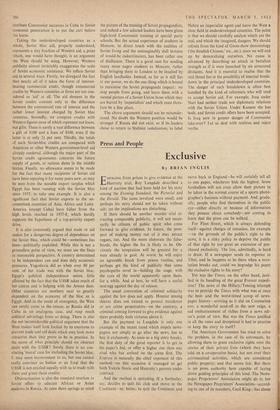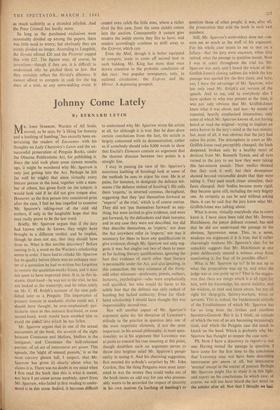Press and People
Exclusive
By BRIAN INGLIS EMERGING from prison to give evidence at the Hanratty trial, Roy Langdale described a kind of auction that had been held for his story among the Evening Standard, the Pictorial and the Herald. The sums involved were small, and perhaps his story should not be taken without salt; yet the implications are disturbing.
If there should be another murder trial at- tracting comparable publicity, it will not neces- sarily be citizens of public spirit who come forward to give evidence. In future, the pros.- pect of making money out of it may attract rogues, too. And the more elaborate the false- hoods, the higher the fee is likely to be. Ob- viously the temptation will be greatest for a man already in gaol. At worst; he will enjoy an agreeable break from prison routine, and perhaps get the kind of publicity that some psychopaths revel in—holding the stage, with the eyes of the world apparently upon them, for a while. And at best, he will have a useful nest-egg against the day of release.
The usual convention of criminal solidarity ;against the law does not apply. Honour among thieves does not extend to protect murderers or sex crime perpetrators—on the contrary, a criminal coming forward to give evidence against them probably feels virtuous about it.
But the payment to Langdale is only one example of the recent trend which impels news- papers not simply to go after the news, but to buy it exclusively. As soon as a big story breaks, the first duty of the good reporter is to get in his paper's bid, or offer a higher one than any rival who has arrived on the scene first. The Express is naturally the chief exponent of this method—on this occasion it managed to get both Valerie Stork and Hanratty's parents under contract.
And the method is spreading. If a footballer, say, decides to quit his club and move to the Continent—or, better, to quit the Continent and move back to England—he will certainly tell all to one paper, whichever bids the highest. Some footballers will not even allow their picture to be taken in the normal course of a sports photo- grapher's business without payment. And, gradu- ally, people who find themselves in the public eye—either directly or because of information they possess about somebody—are coming to learn that the press can be milked.
For Fleet Street, which is always defending itself—against charges of intrusion, for example —on the grounds of the public's right to the news, it is a risky policy to deprive the public of that right by too great an extension of pur- chased exclusivity. The line, admittedly, is hard to draw. If a newspaper sends its reporter to Tibet, and he happens to be there when a revo- lution breaks out, could we begrudge his paper the exclusive rights to his story?
Yet was the Times, on the other hand, justi- fied in its handling of the great Everest expedi- tion? The news of the Hillary/Tensing triumph was to provide the Times with what was at once the best- and the worst-timed scoop of news- paper history—arriving as it did on Coronation eve; a wonderful send-off to the new reign, a sad embarrassment of riches from a news edi- tor's point of view. But was the Times justified in all the ruses and deceptions' it had to practise to keep the story to itself?
The American Government has tried to solve the problem, in the case of its astronauts, by allowing them to grant exclusive rights over the stories of their private lives (which they have sold on a co-operative basis), but not over' their astronautical activities, which are considered public property; and that seems fair. But there is no press authority here capable of laying down guiding principles of this kind. The News- paper Proprietors' Association might do it; but the Newspaper Proprietors' Association—accord- ing to one of its members, Cecil King—has about as much authority as a stranded jellyfish. And the Press Council has hardly more.
So long as the purchased exclusives were reasonably divided up among the papers, there was little need to worry; but obviously they are evenly divided no longer. According to Langdale, the Herald offered £20 and the Pictorial capped this with £25. The figures may, of course, be inventions--though if they are, it is difficult to understand why he pitched them so low. But they certainly reflect the Herald's dilemma. It cannot afford to compete in cash for the big stars of a trial, or any news-making event, It cannot even each the little ones, where a richer rival (in this case, from the same stable) comes into the auction. Consequently it cannot give readers the inside stories they like to have; and readers accordingly continue to drift away to the Express, which can.
Even the Mail, though it is better equipped to compete, tends to come off second best in such bidding. Mr. King has more than once drawn attention to the probable conclusion of this race: two popular newspapers, only, in national circulation: the Express and the Mirror. A depressing prospect.



































 Previous page
Previous page